Start planning for next year: At Knepp, the rewilded estate in West Sussex, treehouses and cabins are quickly snapped up for the limited window (spring and summer) when they are available. It’s the luxury of experience that people are after—to be a part of the conversation and to take away first-hand knowledge of a different kind of land management. At other farm resorts, city folks are encouraged to dip a Wellington boot into country life, with the guarantee of a sublime spa (overlooking regeneratively managed acres) and excellent home-grown food that could not be more fresh.
Join us on a tour of some of the best farm retreats in the British Isles:
Featured image, above, of Heckfield Place.
The Newt, Somerset
Above: The pool at the Farmyard is complemented by the spa at the Newt’s hotel, Hadspen Spa.
An hour and a half by train from Paddington Station, the Newt in Somerset is in cider country, in an atmospheric part of the country that is closely associated with the legend of King Arthur and the music festival at Glastonbury. In terms of luxury, the Newt delivers, and does not even see itself in competition with the likes of Soho Farmhouse or Babington. It aligns itself more with the fashion label Hermès, and certainly once you are in, the bounty is endless and unquestioned, starting with the very superbly equipped mini bar in every room.
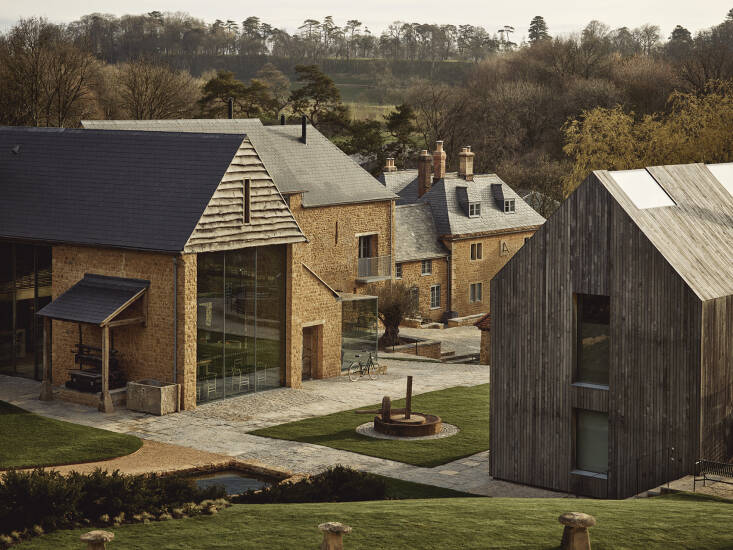 Above: The Farmyard at the Newt. A collection of refurbished buildings brings together a restaurant, state-of-the-art spa, meeting place, and the most comfortable accommodation ever found in a farmyard.
Above: The Farmyard at the Newt. A collection of refurbished buildings brings together a restaurant, state-of-the-art spa, meeting place, and the most comfortable accommodation ever found in a farmyard.
The farm at the Newt in Somerset is described by those who work there as the “beating heart” of the whole operation. Its head of productive growing is David Rowley, whose background is in biodynamic and regenerative farming in the US. The estate butchery, too, prepares heritage breed livestock to exacting standards. Served as small plates, lunch and dinner are leisurely and informal. The Newt’s South African owners also run the Babylonstoren vineyard in the Cape Winelands. Here in Somerset, apples are revered in a way that is usually reserved for grapes, and the fine ciders are very fine indeed. There is also an excellent shop and nationwide delivery service. (For more, see Dash to the Country: Garden Visit to the Newt in Somerset.)
Heckfield Place, Hampshire
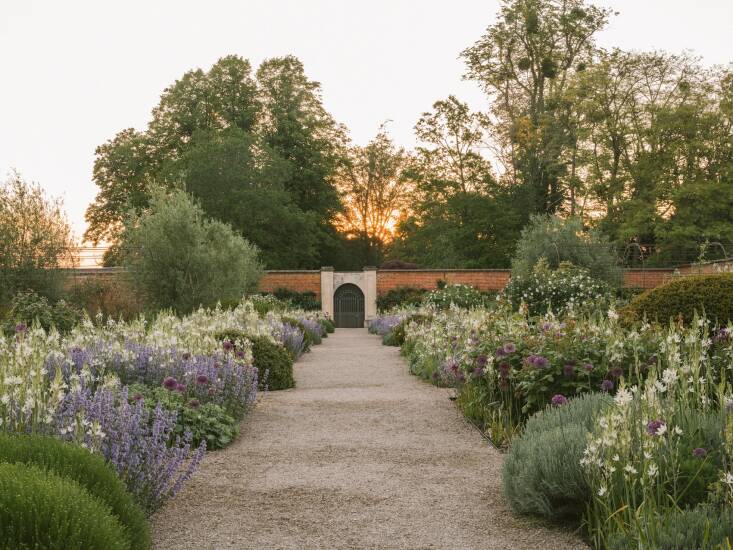 Above: Heckfield Place stands on 438 acres, incorporating an organic farm and fully certified biodynamic garden.
Above: Heckfield Place stands on 438 acres, incorporating an organic farm and fully certified biodynamic garden.
Just over an hour from London, Heckfield Place has impeccable credentials. Renowned chef Skye Gyngell, of Spring in London, is the culinary director, while stellar biodynamic grower Jane Scotter (who brought biodynamic growing out of the shadows with her hugely respected farm, Fern Verrow) has the title of head gardener. Marle, one of Heckfield’s restaurants, holds a Michelin Green Star for its focus on sustainability (and if we were in any doubt, the heating is run on bio-mass boilers and water is from their own bore hole). In the market garden, biodynamic practices are fully embraced, with special preps that are pushed into cow horns and buried underground, as well as cultivating that follows the phases of the moon. See: The Best Vegetables You’ll Ever Taste.
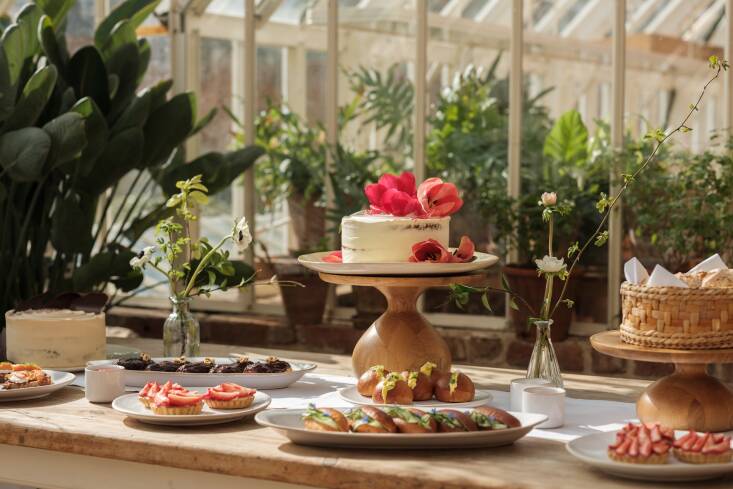 Above: Tea time at Heckfield Place, in one of its seven greenhouses.
Above: Tea time at Heckfield Place, in one of its seven greenhouses.
Heckfield describes itself as “an antidote to modern living,” and full use is made of its orchard, a new dairy, chickens, and flowers for cutting grown on site and used abundantly throughout the different venues. Experiences include swimming, boating, falconry, flower arranging, willow weaving, and a foraged cocktail making workshop. (For more on Heckfield, see A Garden Worth the Wait: Heckfield Place in Hampshire, England.)
Birch Farm, Devon
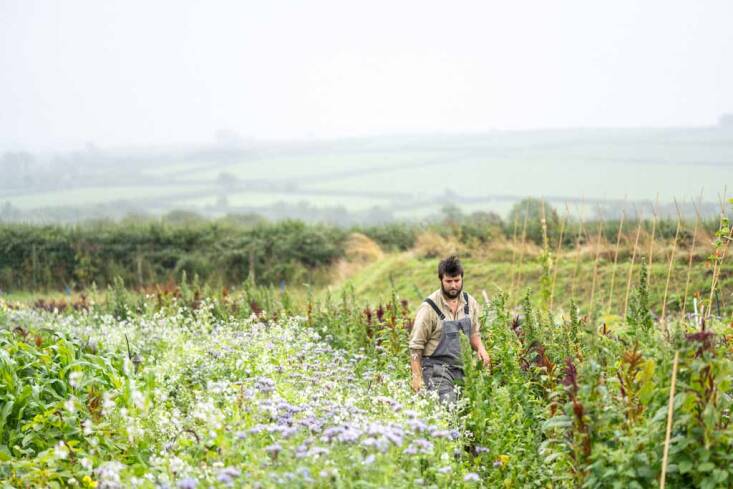 Above: Josh Sparkes, head grower at Birch Farm.
Above: Josh Sparkes, head grower at Birch Farm.
About a decade ago, a couple of tech entrepreneurs, Michael and Xochi Birch, bought some buildings in the small Devon village of Woolfardisworthy (Woolsery for short), two and a half hours from London. Michael had spent happy childhood summers there and had a dream of revitalizing the area. They acquired the old manor house, the post office, the pub, and the fish and chip shop. The final piece of the puzzle? Birch Farm, a 150-acre worn-out former pasture. But the magic ingredient is undoubtedly Josh Sparkes, the head gardener and grower whose résumé includes a stint at Sissinghurst and, more importantly, stays in America and Japan to learn about regenerative food systems. He uses perhaps the most unusual growing techniques in England, coaxing the land back to fertility within an agroforestry system, aided by mysterious soil preparations from Japan and Korea. The produce, along with rare breed livestock, goes straight to the restaurant. Bringing visitors and gardeners (for one-day courses) from far and wide, it’s a very hot ticket.
Thyme, Gloucestershire
 Above: Rare breed Welsh Black Mountain sheep at Thyme, Gloucestershire.
Above: Rare breed Welsh Black Mountain sheep at Thyme, Gloucestershire.
Thyme is a 150-acre estate at Southrop, a quintessential Cotswold hamlet in a designated Area of Outstanding Natural Beauty. Carefully overhauled since the beginning of this century by Caryn Hibbert and Jerry Hibbert, and Caryn’s father, the engineer Michael Bertioli, Thyme is a classic manorial collection of buildings, with the farm sitting cheek by towel with the main house. Interconnected gardens have been made by Bunny Guinness, with topiary galore.
 Above: Thyme’s water meadows and river banks are managed as wild spaces for biodiversity.
Above: Thyme’s water meadows and river banks are managed as wild spaces for biodiversity.
Situated near the town of Lechlade, (two hours from London), the river Leach runs through the lower part of the farm. The kitchen garden benefits from the rich alluvial soil, which is protected through low-impact growing practices. The garden’s produce inspires Thyme’s four restaurants, as well as the cookery school and spa.
Knepp, West Sussex
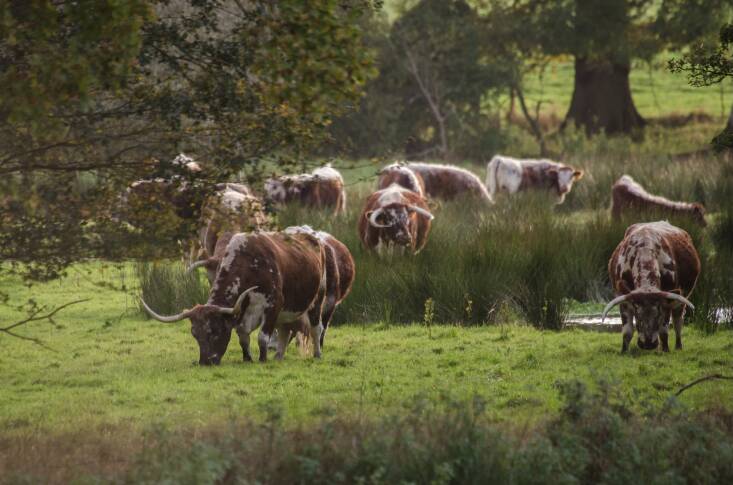 Above: Long horned cattle create disturbances in the land, making pockets and habitats for smaller creatures and manuring the bumpy ground as they go. Photograph by Knepp’s co-owner, Charlie Burrell.
Above: Long horned cattle create disturbances in the land, making pockets and habitats for smaller creatures and manuring the bumpy ground as they go. Photograph by Knepp’s co-owner, Charlie Burrell.
Although the word “safari” is not normally connected with pigs and cows, animal watching is an important part of Knepp’s offering, as the UK’s most famous rewilding project. Spread over 3,500 acres, Knepp is a large estate, with hotspots such as the shop and cafe some distance from, say, the walled garden. Safaris are either vehicle-based “in an open-sided Toyota Land Cruiser” or guided on foot. Either way, it’s a new way of looking at, and thinking about, land use. (Our money is on the Nightingale Safari and Supper.)
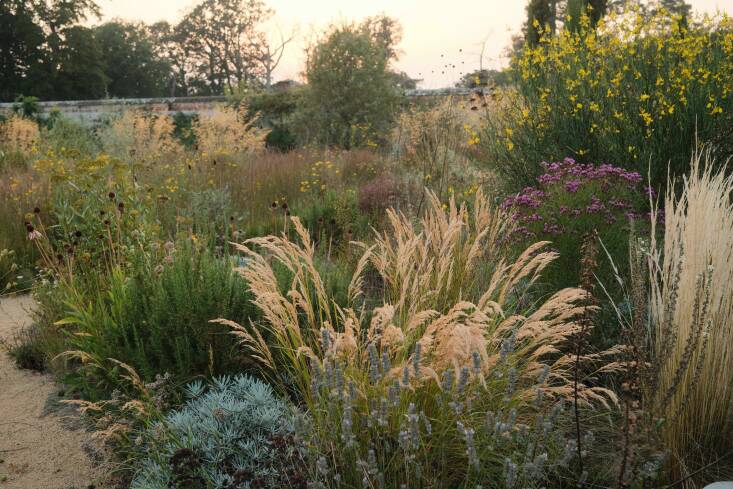 Above: The rewarded Walled Garden at Knepp. Photograph by head gardener Charlie Harpur.
Above: The rewarded Walled Garden at Knepp. Photograph by head gardener Charlie Harpur.
The Walled Garden at Knepp is a formerly lawned family garden, with the swimming pool still in place. Around it, British garden design superstar Tom Stuart-Smith implemented a new, rewilded garden, with input from master plantsman James Hitchmough. It is diligently looked after by Charlie Harpur and his small team. Tours are guided or unguided; it’s a complex garden and we’d recommend the former, where possible.
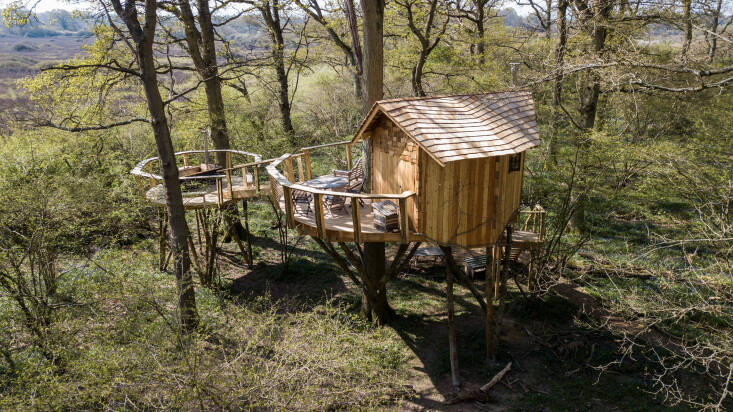 Above: Knepp offers a range of accommodation, from cabins and shepherd huts to treehouses and yurts, well-placed in ancient woodland. Image via Knepp.
Above: Knepp offers a range of accommodation, from cabins and shepherd huts to treehouses and yurts, well-placed in ancient woodland. Image via Knepp.
The Peregrine Treehouse (shown here) is off-grid, like all of Knepp’s accommodation. It has a battery hurricane lamp, bedside reading lights, and a candle lantern. Plus: “an open-air, wood-fired Swedish Hikki bath-tub on a separate platform reached by a wooden walkway.”
And don’t forget The Pig, with various quality iterations popping up (The Pig on the Beach, The Pig in the Wall), The Pig on the Farm is the next one, to open later this year. It will be in the farmhouse and buildings that make up part of an historic estate in Shakespeare country (Warwickshire).
See also:



